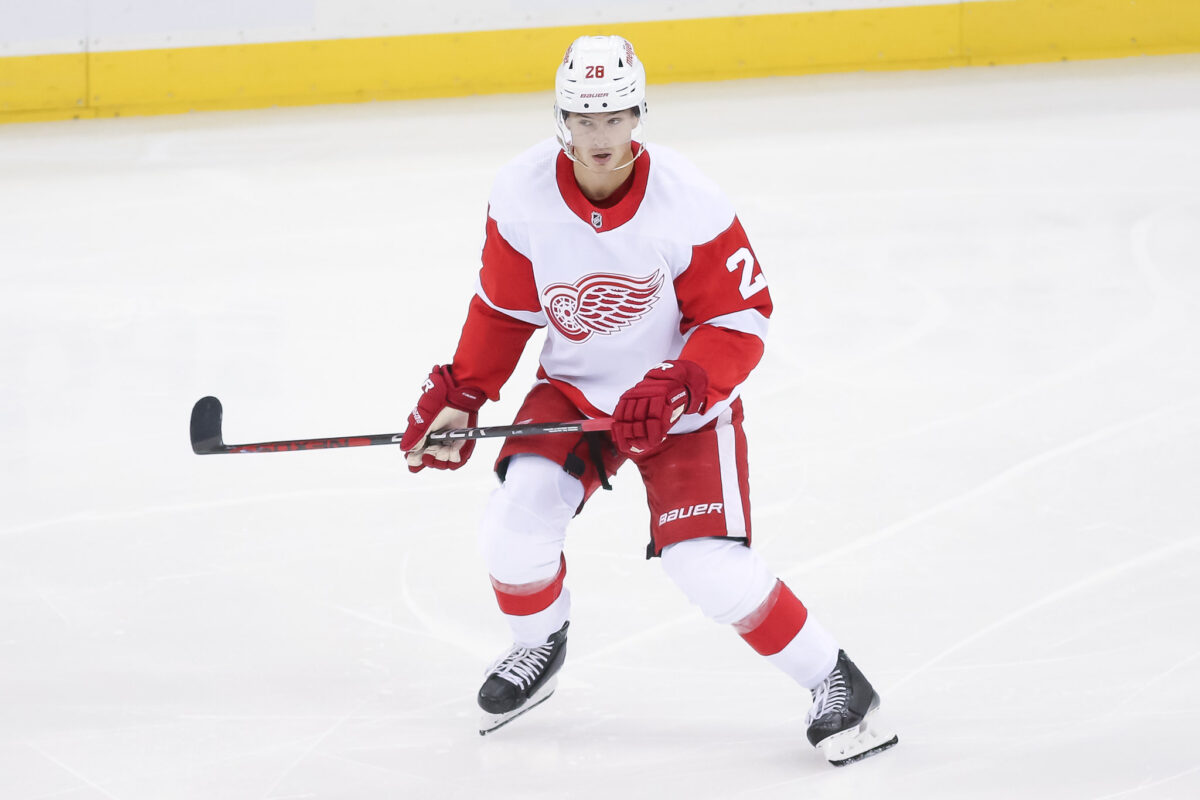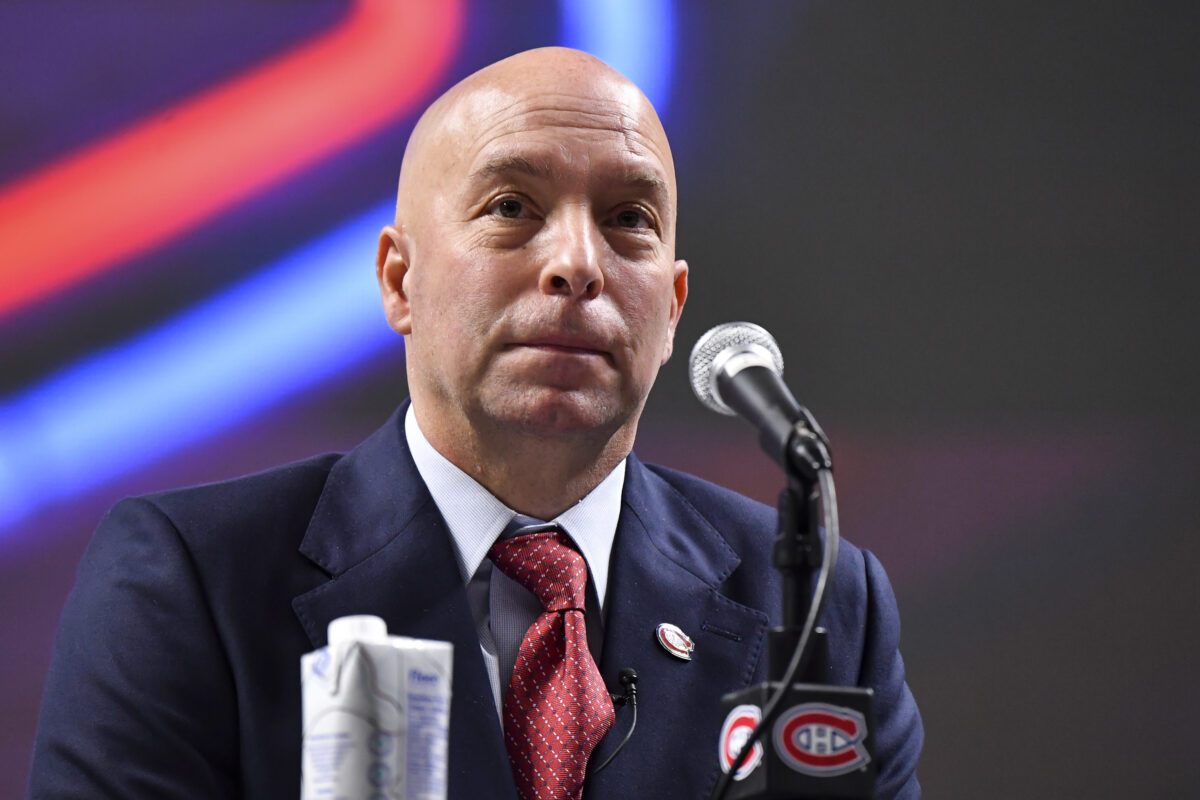Montreal Canadiens forward Joel Armia will likely steal all the headlines after having been cut. He is being named first here after all, because his contract is so significant, arguably one of the worst on the team. However, defenseman Gustav Lindstrom getting cut is arguably more significant, at least from the standpoint of a meritocracy taking shape.
General manager Kent Hughes inherited Armia’s deal from his predecessor Marc Bergevin. So, even though it’s a shock for the Canadiens to apparently demote a veteran, with Hughes having taken strides in the past to be seen as a “player’s GM,” it’s not like he personally owed Armia anything (other than a fair shot to earn a roster spot at training camp).

In contrast, acquiring Lindstrom was one of those aforementioned strides. Hughes accommodated Jeff Petry by trading him soon after his reacquisition from the Pittsburgh Penguins. Not only did Hughes trade Petry to his hometown team in the Detroit Red Wings for all intents and purposes, knowing full well he didn’t want to play for the Canadiens. As a result, he also presumably got much less than had he waited to find a better deal.
Revisiting Petry Trade to Red Wings
That deal? Petry, who’s a top-four defenseman at the very least, for Lindstrom and a conditional fourth-round pick. That’s not great. On top of it all, the Canadiens retained 50% of Petry’s salary. So, the hope had to have been for Lindstrom to spread his wings and develop into a mainstay top-six defenseman at the very least, with Hughes having gone on record that the team’s scouting staff sees him as having reached only 70% of his potential.
Related: Canadiens Still Make Petry’s Short Second Habs Stint Count
So, cutting Lindstrom isn’t a good look in a lot of ways. It’s probably the right decision based on an objective assessment of both his training camp and career to date. After all, with the Red Wings, he averaged just 15:37 in ice time over his four seasons (128 games) to date. Of note, in his first season, he played 16:32. His ice time decreased each season to the point the Red Wings played him just 14:10 per game last season. For context, depth-defenseman Corey Schueneman played 14:42 per game (seven) with the Canadiens last season.

Now, the Canadiens have until late Monday, Oct. 9, to submit their final opening-night roster. As Marc Dumont of Montreal Hockey Now explains, there are no guarantees these decisions are final. A trade could be impending. The Canadiens could recall Armia after having put a player on long-term injured reserve to make space under the cap.
However, as surprising as both of these cuts are, they’re justifiable all the same (based on the unimpressive play of both Armia and Lindstrom in camp). That kind of indicates they’re meant to be of the lasting variety. It would be a cruel practical joke on the fans on the part of Hughes were that not the case, right?
“You know those two players everyone’s saying aren’t good enough? Who are blocking roster spots for players who are more deserving? Well, we just cut them like everyone’s been we saying we should. How do you like us now?
“Psych.”
Assuming Armia and Lindstrom Stay Cut
So, assuming Armia and Lindstrom are intended to stay in the American Hockey League, it does undo some of the goodwill Hughes had built up in players’ eyes. After all, there had been some pushback on the argument the Canadiens should bury Mike Hoffman’s contract based on how it would look to demote a veteran. Trading him to reacquire Petry (and then retrading Petry) instead was a stroke of genius at the time, and it still is to be clear.

It just goes to show there is a limit to what Hughes can do, which is understandable. He can’t move mountains all the time. In this case, passing Armia and Lindstrom off as deserving of spots was a bit too much to ask, especially when younger players like Jesse Ylonen, who outplayed Armia last season, were at risk of getting exposed to waivers.
In Lindstrom’s case on defense, Mattias Norlinder conceivably earned the spot more. If not him, Justin Barron has a higher ceiling and hopefully a long-term future with the team. The rub is, neither of those players have to go through waivers. Lindstrom does, which speaks volumes.
Hughes vs. Bergevin
To be fair, Bergevin went through something like this himself. After nonsensically trading Sven Andrighetto, a forward with top-six upside, to the Colorado Avalanche for Andreas Martinsen in March 2017, he ended up demoting the latter at the start of the next season. Bergevin soon traded Martinsen to the Chicago Blackhawks for career-minor-leaguer, Kyle Baun, effectively making it a write-off.
Granted, Andrighetto didn’t pan out with the Avalanche despite finishing that 2016-17 season on a high with 16 points in 19 games. However, it was the wrong way for Bergevin to go about adding size to his team. Five seasons into his tenure, the Martinsen demotion was far from a definitive moment for him, but it must have been humbling to a degree, especially as, at the time of the demotion, Andrighetto was seen as trending higher up the Avs lineup.
Things are slightly different for Hughes. Everyone knows who Petry is, how much he could have contributed to the Canadiens had he stayed. Everyone knows the Habs could have gotten more for him had they waited to find a better deal. However, the Canadiens still come out ahead if you take all the trades involving Petry as a whole. The Lindstrom acquisition was one bad Hughes trade in a sea of pretty decent ones. Everyone should be able to live with it, just like losing Andrighetto was never going to be what cost Bergevin his job. There were a lot of reasons why in the end, including the Armia contract, one has to think.

Ultimately, if you’re a Canadiens fan, you take the bad with the good, which vastly outweighs the bad right now. That’s at least in terms of the direction in which they’re headed. Decisions like these demotions further show Hughes marches to the beat of his own drum (in Armia’s case) and, while he isn’t infallible like Bergevin (in Lindstrom’s case), the general idea is to make moves in the best interest of the team, regardless of appearances.
If Lindstrom isn’t good enough, he deserves to be demoted, regardless of the circumstances surrounding his acquisition. It’s one step closer towards a true meritocracy taking shape, where those that deserve to stay, do. Everyone should be in agreement that the early returns in Hughes’ case, one full season and change into his tenure, show that he does too.
